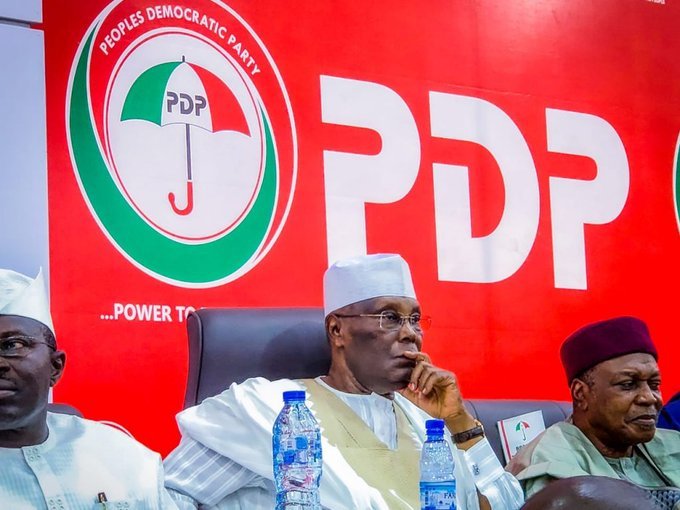Following the verdict of the Presidential Election Petitions Tribunal (PEPT), Atiku Abubakar, presidential candidate of the Peoples Democratic Party (PDP) will today, address a world press conference.
HeraldNG reports that the five-man Presidential Election Petitions Tribunal led by Justice Haruna Tsammani on Wednesday threw out Atiku, Peter Obi’s case and upheld the victory of President Bola Tinubu.
The press conference is scheduled at 2:30 p.m. at the NEC Hall of the PDP National Headquarters in Abuja.
Atiku and his party have rejected the judgment of the PEPT, which they say was a miscarriage of justice. They have vowed to appeal the ruling to the Supreme Court.
The PEPT ruled on Wednesday that the petition filed by Atiku and the PDP challenging Tinubu’s victory had no merit. The tribunal also dismissed the petition filed by the Labour Party’s presidential candidate, Peter Obi.
Atiku’s lead counsel, Chris Uche, said he had received instructions from his client to file an appeal at the Supreme Court.
“The judgment has been delivered, but we have not received justice,” Uche said. “Luckily, the law has given us leverage to go on appeal to the Supreme Court. We have instructions from our clients to go to the Supreme Court. The struggle continues.”
The press conference will allow Atiku and the PDP to outline their plans for the next steps in their legal challenge. It will also be a chance for them to address the public about the ruling of the PEPT.
Tsammani-led Panel’s Verdict
The Tsammani-led panel of justices dismissed all the arguments and the evidence led by the petitioners.
The petitions were not supported by “credible evidence”, Mr Tsammani ruled, with his colleagues on the bench also stressing the same finding in their concurrent opinions.
“Election petition is a serious issue,” Ms Bolaji-Yusuf remarked in a clear expression of her displeasure about what she considered to be evidence-starved cases of the petitioners. “A petitioner is not permitted to engage in fishing expedition or a roving enquiry as the petitioners herein did.”
“It is clear from the outset that the petitioners were engaging in wild goose chase and an inquisitorial adventure,” she added.
The court also spotlighted procedural blunders committed by the petitioners’ legal teams.
One such was the court’s finding that the petitioners failed to comply with strict legal and judicial authorities that mandate petitioners to file the statements on oath of all their witnesses along with their petitions or before the close of the three-week window for filing an election petition.
Lack of adherence to this led to the court rejecting 10 out of the 13 witnesses called by Mr Obi and 15 out of the 27 presented by Atiku.
The court, therefore, expunged all the testimonies of the affected witnesses and the exhibits they tendered.
“While they were complaining of non-compliance with the provisions of the Electoral Act against the first respondent (INEC), their own petitions were massively deficient and were in non-compliance with the same Electoral Act,” Mr Adah said.
The court also dismissed a substantial number of paragraphs of the petitions that were adjudged to be “vague”, “imprecise”, and “generic” with no particulars, such as the details of polling units alleged irregularities took place.
The court resolved all the key issues raised by the petitioners against them and upheld the arguments of the respondents – the INEC, Mr Tinubu, Mr Shettima, and the APC.
For instance, it dismissed the claim by the petitioners that Mr Tinubu needed to have won 25 per cent of the lawful votes cast in the federal capital even when he had met the requirement in more than two-thirds or 24 out of 36 states of the federation. The court said all votes are equal, as such, the votes of the federal capital voters could not have superior value.
The court also dismissed the issue of the judgement of a US District Court in Northern Illinois, which ordered the forfeiture of $460,000 belonging to Mr Tinubu, and said it could not be a basis for disqualifying him from running for the presidency.
Ms Bolaji-Yusuf held that it was “civil forfeiture” and not a “criminal forfeiture”.
She said civil forfeiture or non-conviction-based forfeiture “is not a conviction or verdict of guilt after an indictment, trial and conviction”. He said it was used “when the government’s interest is merely to recover proceeds of unlawful activity.”
She explained further that the criminal forfeiture envisaged under section 137(1)(d) of the constitution cited by the petitioners “is the seizure of the property connected with a crime after obtaining a conviction, as part of the sentence for the crime.”
The court also ruled the Supreme Court had decisively decided the alleged double nomination of Mr Shettima as APC’s vice-presidential candidate and Borno Central candidate as untrue.
The court held that Shettima had withdrawn his nomination as a senatorial candidate before he was nominated Mr Tinubu’s running mate.
The court also held that the failure of INEC to upload polling unit results to IReV, an online portal accessible by the public to view scanned copies of the result sheets in real time, did not invalidate the election results.
The court said the collation process of results recognised by law is manual, adding that IReV “is not a collation system”.
Ms Bolaji-Yusuf said the petitioners claimed that it was impossible to do a valid collation of results because INEC failed to transmit the election results electronically.
Both Atiku and Mr Obi have indicated their intentions to appeal against the judgement at the Supreme Court, which is the final court on presidential election matters.



Leave a Reply